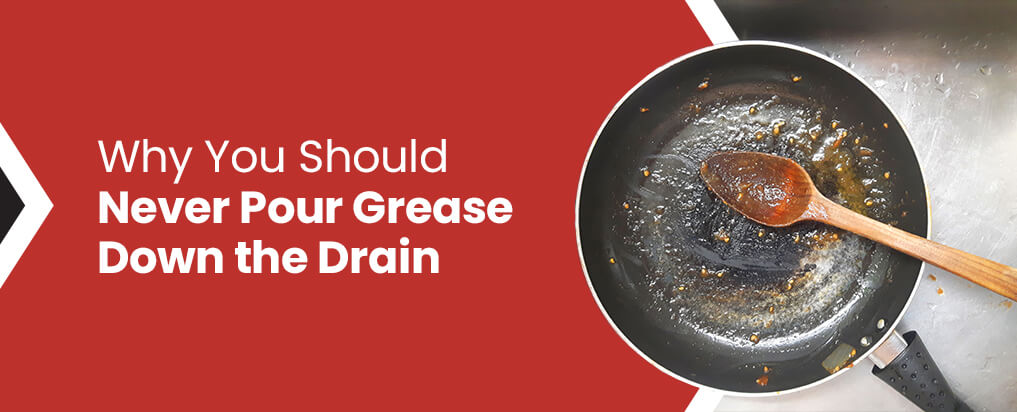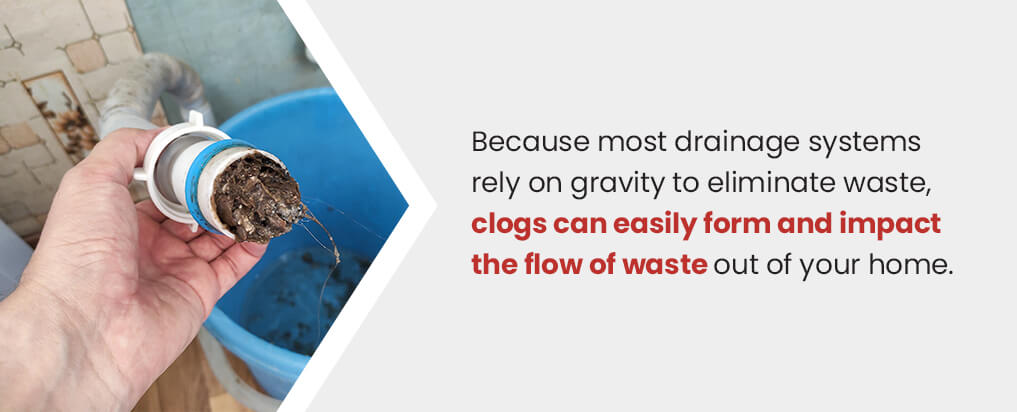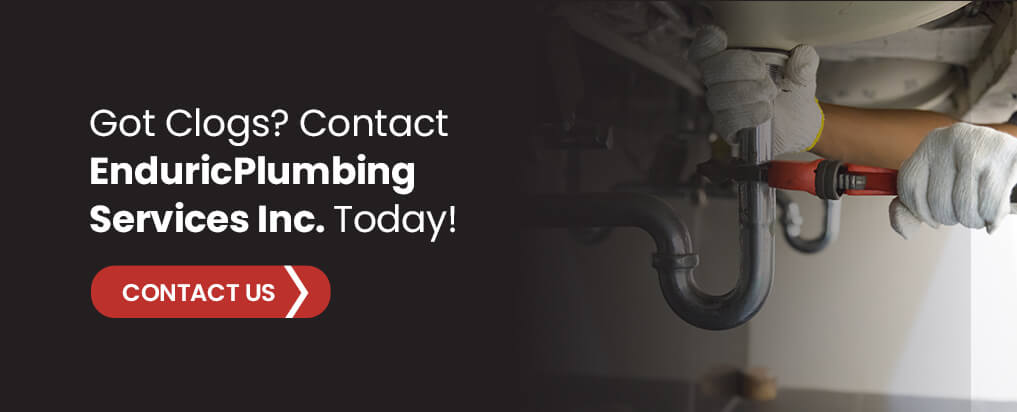
June 17, 2022
Contents
Fats and cooking oils are essential for creating delicious meals, but why are some solid at room temperature while others remain liquid? What happens when you pour these ingredients down your kitchen drain? It’s important to understand how to treat your plumbing system so you don’t encounter issues like grease clogs, backups and smelly sinks.
Continue reading to learn why you should never pour grease or oil down the sink.
Why Is It Bad to Pour Grease Down the Drain?
Because fats, oils and grease become liquid when heated, it’s easy to accidentally pour them down the drain. Often, many people do this without realizing there can be serious complications.
Grease solidifies as it cools because of its molecular structure. Fat molecules have long hydrocarbon chains, which means the molecules can pack tightly together and form a solid at room temperature. Oils remain liquid at room temperature because their molecules do not fit together as neatly.
While grease is definitely bad for drains because it becomes solid at room temperature, cooking oils will also cause issues in your plumbing system. While cooking oils like olive and canola remain liquid most of the time, they can start to form solids in cold temperatures, making them especially harmful in underground sewage pipes where the temperature is often much lower than above ground.
What Happens if Grease Goes Down the Drain?
Most communities use wastewater treatment facilities to treat or “clean” the waste they flush down their toilets, sinks, washers and other appliances in the home. This waste leaves your house via plumbing pipes that use the force of gravity to help waste travel. The pipes connect to the community’s sewer system. From there, the waste travels to a wastewater treatment facility.

Because most drainage systems rely on gravity to eliminate waste, clogs can easily form and impact the flow of waste out of your home. Pouring cooking oil down the drain is bad because it will accumulate in the pipes and cause significant issues for your home’s plumbing system. The grease itself may become so thick it clogs the pipe, or the grease will cause other particles to stick together and form a tight clog.
A clogged pipe can prevent your home’s wastewater from draining into the sewer system as it should, causing all kinds of issues, including:
- Slow drainage
- Drain blockages
- Foul odors from the sink
- Basement and backyard sewage overflows
- Street sewage overflows
- Groundwater contamination
In addition to clogs and backups, grease buildup and oil can impact the chemistry of the waste and prevent the bacteria from breaking it down if you have a septic tank.
You also cannot pour grease down the drain with hot water, as the impact on the drainage system is still the same. While the hot water may help heat the grease and oil as it drains down the pipe, the water will eventually cool, and along with it, the grease, which may cause a grease buildup.
What to Do After Pouring Grease Down the Drain
If you accidentally poured grease down the drain, it’s important to act quickly. There are a few things you can do to mitigate the negative consequences:
- Pour very hot water down the sink.
- Sprinkle a good amount of baking soda into the drain.
- Pour white vinegar down the drain to create a fizzing reaction with the baking soda.
If you don’t catch the grease right after it’s gone down the drain, you can still use hot water and the baking soda and vinegar mixture as a drain cleaner to help clear any clogs. You may also need to use a drain snake to loosen and pull up any debris. If these methods don’t help, you should call a plumber. Do not pour liquid de-clogging chemicals down your drain, as they can corrode the pipes.
How to Dispose of Grease Correctly
If you’re using grease or cooking oil when you cook, it’s important to know how to properly dispose of it so you don’t harm your home’s plumbing system. Hot grease and oil can also cause bad burns and can lead to fires, so you must be careful when handling them. Always supervise minors around cooking oil and grease.
If you’re cooking meats, the fat from the meat melts off into the pan, leaving you with a pool of drippings after you’re done. If you leave the pan to cool, you’ll notice these drippings become solid from the meat’s leftover fat. If you wait for the cooking grease to cool completely, you can use a spatula to transfer it from the pan to the trash and wipe it out with a paper towel.
The best way to get rid of cooking grease when it’s warm is to:
- Let the pan and grease cool for a few minutes.
- Grab a glass jar or old tin can. If you use a glass jar, run the outside of the jar under hot water, as pouring hot liquid into a cold glass jar could cause it to break.
- Place the jar on top of a paper towel or newspaper and carefully pour the cooled grease into the container. You might also use a spatula to ensure all the grease gets out of the pan.
- Throw the jar or tin away, or close the tin and store in a cool, dry place until it is full. Some people use old grease for cooking, but it’s important to store it properly to prevent it from going bad.
- Before rinsing the pan, wipe it down with paper towels to remove any leftover grease residue.
If you use cooking oil to saute or fry your food, you should dispose of it properly. If there’s just a little in the pan, you can wipe it out with a paper towel before cleaning it. If you use a lot of oil for frying, you can save and reuse it. If not, pour it into a container to throw out, or find a local site where you can recycle the old cooking oil.
Why Is It Important to Dispose of Grease Correctly?
The impacts of disposing of grease and cooking oil down the drain can be much more serious than a sewage backup at your own home. If you put grease and other items or liquids down the drain that should not go there, you can cause grease clogs for your whole community’s wastewater system.
When a wastewater system backs up or overflows, it releases hazardous waste and chemicals into natural lakes, streams and coastal waters, harming the environment and the wildlife. Protecting the environment is a community effort, which is why everyone can play a part by disposing of their cooking oil and grease in the proper manner.
Got Clogs? Contact Enduric Plumbing Services Inc. Today!
If you suspect your sink is backed up because of cooking oil and grease, call Enduric Plumbing Services Inc. so we can help evaluate your system and diagnose the problem. We offer both residential and commercial plumbing services, so we can solve any clogs or backups and evaluate your entire system to make sure it’s reliable for years to come.
We can address issues from leaking faucets to clogs to sewer line repairs and installation. Our licensed and insured plumbers are happy to help with any plumbing issue you have, so contact us today.



